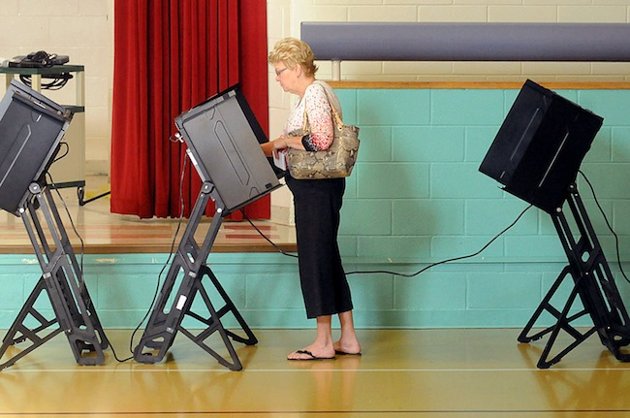No More Stolen Elections!
Unite for Voting Rights and Democratic Elections
NYT: North Carolina's election machine blunder

The November election may feel like ancient history, but it is still going on in North Carolina. The state has been unable to swear in an agriculture commissioner because a single malfunctioning electronic voting machine lost more ballots than the number of votes that separate the two candidates. The State Board of Elections, the candidates and the public are sharply divided on how to proceed. The mess North Carolina finds itself in is a cautionary tale about the perils of relying on electronic voting that does not produce a paper record.
When the returns came in for the agriculture commissioner race, two things were clear: the Republican, Steve Troxler, and the Democrat, Britt Cobb, were just 2,287 votes apart, and a voting machine in Carteret County had lost 4,438 votes. The machine had mistakenly been set to keep roughly 3,000 votes in its memory, which was not enough. And in a spectacularly poor design decision, it was programmed to let people keep "voting" even when their votes were not being saved.
There have been many suggestions for what to do next. The State Board of Elections initially wanted to have a revote limited to Carteret County, but a court struck that down. Then it scheduled a new statewide election, but that, too, was held to be improper. The elections board, which is bitterly divided along partisan lines, has been ordered by a judge to try again to find a way to resolve the election. But no one is predicting it will be easy. "There are conflicting and little-used statutes and constitutional provisions that may not be consistent with each other," says Don Wright, the general counsel of the elections board.
In the meantime, both sides are promoting methods that appear designed to ensure that their candidate wins. Republicans want to count 1,352 affidavits recently collected by Mr. Troxler from Carteret County voters saying that they voted for him on the faulty machine. They say that if the affidavits were counted, it would be mathematically impossible for Mr. Cobb to win. Democrats say this would violate the principle of a secret ballot and open up the possibility of voter coercion. Some of Mr. Cobb's backers argue that the State Constitution requires that the race be decided by the state legislature, which just happens to be in Democratic hands.
North Carolina agriculture commissioner may not be the loftiest of offices. But if the same glitch had occurred in Washington, where Christine Gregoire was just elected governor by 129 votes, it would have destabilized the entire state government. If it had occurred in Florida in 2000, where President Bush's margin was just 537 votes, it would have undermined an entire presidential election.
North Carolina's plight underscores a basic point about elections: because there are often problems, there must be a mechanism for a recount. If the Carteret County voting machine had produced a voter-verified paper record each time a vote was cast, these paper records could have been be counted and the matter would be resolved. But electronic voting machines that do not produce paper records make recounts impossible.
The one positive thing to come out of the agriculture commissioner race fiasco is that it has prompted North Carolina to reconsider its use of paperless electronic voting. As the state ponders the issue, it should look to Ohio. Kenneth Blackwell, the Ohio secretary of state who did so many things wrong as elections supervisor last year, recently did one very important thing right. He directed all of the state's counties to adopt paper-based optical-scan voting systems. If Carteret County had voted on machines that produced a paper record, North Carolina would not have the constitutional crisis it has now - it would have an agriculture commissioner.
Democracy SquareLiberty Tree FoundationNo More Stolen ElectionsDemocracy SquareDemocracy SquareLiberty Tree FoundationNo More Stolen Elections